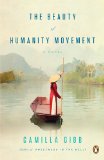Summary | Excerpt | Reading Guide | Reviews | Beyond the Book | Readalikes | Genres & Themes | Author Bio

A Novel
by Camilla Gibb
"There you go, Bình," Hung says, as he does every morning, dropping a handful of chopped green herbs into his bowl from shoulder height with exacting flourish.
"Hung, what happened to your glasses?" Bình asks of the crack that bisects the left lens.
Hung, loath to admit he inadvertently sat upon them last night, shrugs as if it is a mystery to him too.
"Come" - Bình gestures - "let me fix them for you."
Hung dutifully unhooks his glasses from his ears and hands them to Bình's son, Tu, who is waiting beside his father with his empty bowl. Tu tucks them into his father's shirt pocket, and Bình shuffles left, making way for his son.
Tu, just twenty-two years old but so full of confidence, greets Hung with more words than Bình ever does and waves his chopsticks left and right as he tries to calculate the size of the pool. This is very much like him - Tu loves numbers in a way that seems to pain him. He used to teach math at a high school, but he has abandoned that recently in favor of entertaining tourists. Hung is not sure all that foreign interaction is good for the boy, but he trusts Bình is monitoring the situation.
Hung indulges Tu with a challenge this morning: "I'd like to see you calculate the pool's volume in terms of the numbers of bowls of pho that would be required to fill it."
Tu grins as he maneuvers his way carefully across the pool, holding his bowl right under his nose, the steam rising like incense smoldering in a temple to bathe his face.
Hung has taught Tu, Bình and Bình's father, Dao, before him that you can tell a good broth by its aroma, the way it begs the body through the nose. And pho bac - the pho of Hanoi - is the greatest seducer, because of the subtle dance of seasonings that animates the broth. It is not just the seasonings that make pho bac distinct, it is provenance, a lesson Hung would happily deliver to anyone interested in listening.
The history of Vietnam lies in this bowl, for it is in Hanoi, the Vietnamese heart, that pho was born, a combination of the rice noodles that predominated after a thousand years of Chinese occupation and the taste for beef the Vietnamese acquired under the French, who turned their cows away from plows and into bifteck and pot-au-feu. The name of their national soup is pronounced like this French word for fire, as Hung's uncle Chien explained to him long ago.
"We're a clever people," his uncle had said. "We took the best the occupiers had to offer and made it our own. Fish sauce is the key - in matters of soup and well beyond. Even romance, some people say."
It was only with the painful partitioning of the country in 1954 that pho went south; the million who fled communism held the taste of home in their mouths, the recipe in their hearts, but their eyes grew big in the markets of Saigon and they began to adulterate the recipe with imported herbs and vegetables. The phos of Saigon had flourished brash with freedom and abundance while the North ate a poor man's broth, plain and watered down, with chicken in place of beef as the Party ordered the closure of independent businesses like Hung's and a string of government-owned cafeterias opened in their place.
Terrible stuff it was, gray as stagnant rainwater in a gutter. Those who are old enough to remember it thank Hung for getting rid of the moldy taste in their mouths. Kids of Tu's generation probably can't even imagine it. Tu was born just before the government's desperately needed economic reforms of 1986, when the market was liberalized in order to alleviate starvation and independent ownership once again became a possibility. Only then could the true potential of pho be realized.
The challenge for Hung now has less to do with the availability of ingredients than with the need for restraint. Hung sees himself as a guardian of purity, eschewing bean sprouts and excessive green garnish in accordance with northern tradition. They may well have opened their doors to the world, but that does not mean they must pollute their bowls. an bac, mac nam, they say - "eating as in the North, clothing as in the South" - something so fundamental must be respected through deference to tradition.
Hung is a man governed by such principles rather than any laws, particularly those keenly enforced by the police that are of greatest inconvenience to him and those he serves. When the officers come to ticket him for trespassing or operating without a license after he has had the peace of setting up shop in the same location for a few consecutive days, his customers will be forced to run off clutching their bowls, sloshing broth against their freshly pressed shirts, losing noodles to the pavement, jumping aboard their motorbikes and lurching into the day.
Excerpted from The Beauty of Humanity Movement by Camilla Gibb. Copyright © 2011 by Camilla Gibb. Excerpted by permission of Penguin Press. All rights reserved. No part of this excerpt may be reproduced or reprinted without permission in writing from the publisher.
Your guide toexceptional books
BookBrowse seeks out and recommends the best in contemporary fiction and nonfiction—books that not only engage and entertain but also deepen our understanding of ourselves and the world around us.